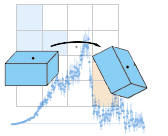
| HOME | PEOPLE | RESEARCH | ACADEMICS | TRAVEL/VISITORS | LINKS | CONTACT |

|
Web Mail
Mailing Lists
Computing Resources
Site Map
Mathematical techniques for the design and control of solidification and forming processes
Nicholas Zabaras, Cornell University, Associate Professor, Sibley School of Mechanical and Aerospace Engineering
Monday, October 25, 199911:00 AM to 12:00 PM
Steele 102
A number of techniques will be presented for the design of continuum systems with application to solidification and forming processing.
The physical mechanisms that influence to a significant degree the obtained solidification microstructures include processes like heat and mass diffusion, natural and solutal convection, thermocapillary (Marangoni) convection, forced convection (e.g. electromagnetic stirring) and solutal/kinetic/surface-tension undercooling. To be able to design solidification processes with desired microstructures, one should understand the effects of each of these physical mechanisms on the microstructures and develop mathematical, computational and experimental tools for their control. The technical means available for such control include mold/furnace cooling/heating conditions and various means of forced convection. Some examples from our recent work on the design of stable directional solidification processes for binary alloys with desired growth will be presented.
In the second part of this presentation a novel, efficient and mathematically rigorous methodology will be presented for a continuum based sensitivity analysis of metal forming processes. A framework for shape as well as parameter optimization for single and multi-stage metal forming processes will be reviewed. Weak equilibrium, constitutive and contact sensitivity equations are derived for the large deformation of the workpiece in a typical forming operation.
The contact sensitivity subproblem is defined after a number of regularizing assumptions are introduced to allow the differentiability of the contact and frictional conditions governing the direct problem. The effectiveness and accuracy of the proposed methodology will be demonstrated with practical design problems in single as well as multi-stage forming processes.
|
©2003-2011 California Institute of Technology. All Rights Reserved webmaster |
|